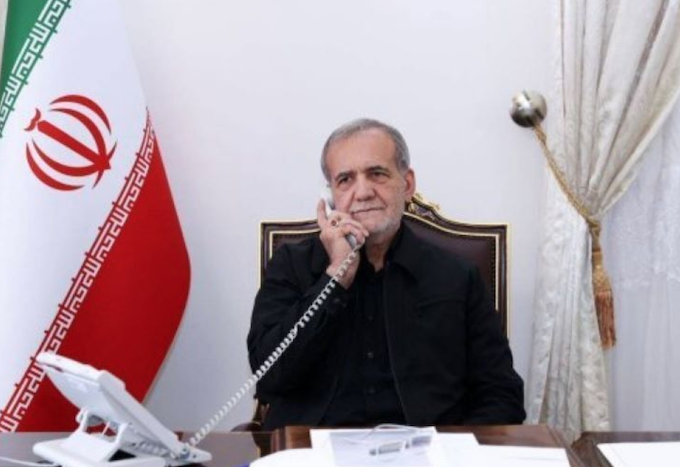
Iran may be about to launch a “proper” missile strike on Israel for the first time ever — in retaliation for the attack on Tehran last month which killed Ismail Haniyeh. Israeli intelligence says an attack is likely to come within days.
The Jerusalem Post on August 11 quoted Ahmad Bakhshayesh Ardestani, a member of the Iranian Parliament’s National Security Commission, as saying: “Iran’s aerial operations against Israel could last three to four days.”
Lebanon’s Hezbollah has also vowed a major revenge strike for the recent attack on Beirut.
Once the first Iranian missiles hit — and it won’t be a polite warning like the drone and missile attack on Israel in April in response to the deadly Israeli strike on the Iranian diplomatic mission in Damascus — we could very quickly see missile traffic jams in the sky as both sides work their way up the escalation ladder.
Lebanese Hezbollah apparently have more than 100,000 missiles, many capable of hitting anywhere in Israel. Iran’s potential is far greater still.
If Iran hits back it is going to involve advanced missiles with no warning and almost certainly casualties. Israel’s much-vaunted Iron Dome is likely to fail. Iran’s historic first-ever strike on Israel in April was in fact carefully sign-posted and choreographed in concert with the USA and other players; with the deliberate intention of minimising casualties.
The apparent quid pro quo was that the US would restrain Israel and ensure Iran was not attacked again.
‘That deterrence not enough’
“With hindsight, that deterrence was not enough,” says Professor Mohammad Marandi, a member of the Iranian nuclear negotiations team, “and so this time around, the Iranians are going to have to hit harder. The Europeans and Americans refused to stop the Israelis from carrying out attacks, so Iran cannot depend on sane European leaders or sane American leaders.”
Marandi has a point. Iran went to the UN Security Council in April after Israel struck its embassy in Damascus. The US, UK and other Western allies ensured Israel faced no censure for this flagrant breach of international law. Most recently they also failed to condemn Israel for the Beirut and Tehran attacks that killed two leaders.
“It wasn’t just a decapitation strike of a leader; it was a decapitation strike on the peace process,” says Palestinian analyst Rula Jebreal.
Professor Nasr Vali of Johns Hopkins University, a former senior adviser at the US State Department, says Israel is goading Iran into a war and we are witnessing a watershed moment in the world: “The international liberal order is truly dead if the upholder of its core values since World War II no longer really believes in those values or applies them extremely selectively.”
Palestinian analyst Rula Jebreal: “It wasn’t just a decapitation strike of a leader; it was a decapitation strike on the peace process.”

A complacent West is going to get a tremendous fright when this kicks off. Should Israel hit back hard (its default setting) and the US join an attack (likely, given Israeli control of the US Congress), the knock-on effects could include the closing of the Persian Gulf which will mean the ceasing of oil and gas shipments from Saudi Arabia, Qatar and the other Gulf states for months or longer.
Professor Marandi says Iran does not want to see the worst case come to pass, not least because of its effect on friends and allies.
‘Global economic meltdown’
“Countries across the Global South don’t want to see a global economic meltdown – because if there is a regional war, that’s what’s going to happen,” he says.
“If the Americans get involved, let’s say, and strike Iran, all those countries that host American bases in the Persian Gulf region, they will be [viewed as] hostile.
“All those oil and gas installations, they’ll be gone. In Iraq, the Americans will be overrun. The global economy will collapse.”
If a militia like the Houthis can impose control over the Red Sea for the last several months (driving Israel’s primary Red Sea port of Eilat to declare bankruptcy recently) imagine what a major power like Iran could do to the Persian Gulf in response to a US attack?
What are the odds of all this happening? The first part is a near-certainty: the Iranians and Hezbollah know that if they do not respond forcefully to the attacks on Tehran and Beirut the US and Israel will continue similar attacks on capitals and territories across the region.
Iran will be calculating how hard to strike to achieve deterrence — to bring an end to the sense of impunity — but not so hard that a major war ensues by necessity. Will Israel get the message? Will the US choose sanity over madness?
The unknown is how targeted the attack will be, what the death toll will be, what assets will be hit and most importantly of all will the Israelis counter-strike? Most people in the West assume the devastating combined power of the US and Israel will prevail. Maybe.
Hypersonic missiles
Some defence experts, however, say that Iran now has the missile technology, including hypersonic missiles, in sufficient quantities to take out every US ship and military base in the region. That is the last thing the Iranians want because they know full well what the other side is also capable of.
Trump says, if he were President and Iran attacked Israel he would wipe the country of 80 million people off the map.
If the US foolishly joins in the fighting, however, the Iranians will, out of necessity, have to strike — and that in turn will imperil all the Gulf States and the ruling elites/monarchies in the region, none of whom enjoy wide support among their populations who are seething at what is being done to Gaza.
On the Lebanese front the very real danger, as UN Secretary-General António Gutteres warned in June, is that Israel and America try to do to Lebanon what they are doing to Gaza.
Enter Türkiye: An attack on Lebanon could necessitate Türkiye’s entry into the war.
“Türkiye stands with the brotherly people and state of Lebanon. I call on other countries in the region to stand in solidarity with Lebanon,” President Erdogan said recently.
Netanyahu’s plans to spread the war to the region will lead to a big catastrophe,” he said, adding that the Western support for Israel was “pitiful”.
Some think Erdogan is blustering, a risky assumption. The threat alone should set heads spinning. Türkiye not only has the largest army in the region; it is a member of NATO.
Witness the unthinkable
If the US attacks Lebanon in concert with the Israelis, we could witness the unthinkable: two NATO countries on opposite sides of a major war! Decades of American foreign policy would lie in tatters.
Chas Freeman, a former US Ambassador to Saudi Arabia, shakes his head in horror.
“Mr Netanyahu doesn’t have any path out of the abyss he has led his country into. Israel can’t do much without our support yet we have given them a blank check.
“Israel resolutely resists any attention to American interests as opposed to its own. Israel is basically an albatross around our neck.”
Professor John Mearsheimer raises another risk to a key pillar of US foreign policy.
“You want to remember that if you really slam Iran, that’s going to give Iran a very powerful incentive to acquire nuclear weapons,” Mearsheimer says. He also points to more blowback from US bungling important relationships.
“Russian military planes and experts have been streaming into Iran delivering support in forms we can only speculate on. Russia will perceive any US attack on Iran as a strategic threat to itself.
A global ‘Axis of Resistance’
“We’re driving the Chinese, Russians, Iranians and North Koreans closer and closer together. It’s the Axis of Resistance on a global scale, and there’s no evidence that this is going to change anytime soon. This is certainly not in our interest.”
Nobody, absolutely nobody, is going to win if war breaks out. The US will bear tremendous responsibility for a coming calamity because they have allowed Israel to become a genocidal state, an apartheid state, a brutal occupier, a land thief of Olympic proportions and a gangster terrorising the entire region.
Israel’s triumph — seizing the rudder of US foreign policy via the Israel lobby — could ultimately prove fatal to its own interests.
Governments in the West, like those of Australia and New Zealand, should abandon their current servile posture towards a feckless, militaristic USA and insist on diplomacy, an immediate end to the genocide in Gaza and the illegal occupation of Palestine by the Israeli state, and, at long last, genuine respect for international law.
Eugene Doyle is a writer based in Wellington. He has written extensively on the Middle East, as well as peace and security issues in the Asia Pacific region. He hosts the public policy platform solidarity.co.nz.











































